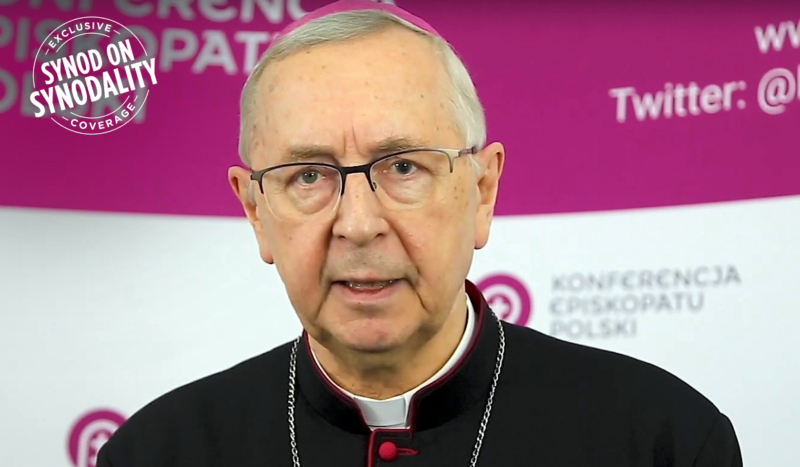
CV NEWS FEED // Archbishop Stanisław Gądecki, President of the Polish Bishops’ Conference, shared his hopes and concerns for the synod in an interview this week, warning about the risks associated with confusion over what synodality and inclusion truly mean.
The Archbishop said the “first rule of synodality” is the acceptance of “what is the unanimous opinion of all and not just the opinion of the majority. What is not the opinion of all should be rejected.”
About the “listening” to the Holy Spirit taking place at the synod, he expressed his hope “that the fruit of this discernment will be the acceptance as final conclusions only of what is synodal.”
He said the second criterion for synodality is” fidelity to the teaching of the Second Vatican Council and the advancement of its understanding.” He went on:
The question is not to hold the Third Vatican Council or to criticize modernity or antiquity. It is about fidelity to Tradition understood not in a sentimental way, but as a manifestation of a theological and institutional hermeneutics of continuity. We cannot afford to disrupt this continuity or to persist in some fossil. Tradition, as we understand it, is the unchanging substance of the truths of faith and the constant advancement of their content.
Regarding recent debate over the meaning of “inclusion,” Gądecki highlighted that “Christianity is a religion that has no intention of driving anyone away, but wants to attract,” but, he warned, “the problem lies in the precise interpretation” of what an inclusive Church looks like.
“If inclusiveness were to mean accepting the sinful tendencies that some people notoriously indulge in without intending to change their conduct” he said,”then things get complicated.”
He argued that “while we must show mercy to sinners, what are we to do about organized ideological structures which make it part of their agenda to affirm behavior contrary to the word of God and as such wish to be accepted by the Church?”
As an example, the Polish Archbishop highlighted that it is one thing “to accompany a man struggling with his sexual identity, and quite another to expect the Church to accept the LGBTQ+ movement and ideology. The latter would mean not only questioning biblical anthropology and teaching on marriage, but also the very truth of the creation of human beings as male and female.”
Gądecki said he hopes for “a spiritual awakening,” saying that during the synod preparation process “we have become familiar with the challenges faced by the Church on different continents and have come to realize their diversity.”
“For one continent the main challenge is poverty, for another it is hospitality, for yet another it is issues of marriage and family life,” he said. He added that “arguably, Europe is in the most difficult situation” because “it is clear that our continent shows the greatest tensions and differences of perspective on how to fulfill the mission of the Church.”
He continued:
The synodal reality is ambiguous. So are the voices emerging from different continents. The worst thing would be if these radically different voices were accepted as legitimate and accepted in different countries as binding. This would mean that the one universal Church would become a loose association of many different local or national Churches.
Asked about what the Church in Poland can offer the universal Church at the synod, Gądecki said: “We have something priceless to offer, namely fidelity to the Church’s teaching.This is at least self-declared fidelity, a desire for it. This fidelity usually manifests itself in the teaching and statements of the Polish clergy, despite the various ‘excesses’ we can sometimes witness.”
“We are greatly hopeful,” he continued. He explained that the Polish bishops are addressing important issues within the Church, commissioning specialists to “analyze and elaborate on them.”
“We take up the issue of the sacrament of Holy Orders, the celibacy of the clergy, and the diaconate of women,” he said. “We have also compiled a study on governance in the Church, the primacy of Peter, synodality and collegiality, because from what we have seen at the continental stage of the synod, these concepts are sometimes used vaguely.”
“However, we would not want to be the ‘stumbling blocks’ and oppose a desire to deepen the Church’s teachings,” he added.

